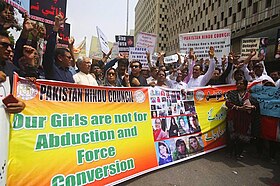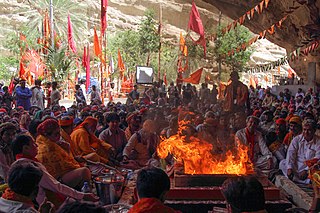
In Pakistan, it is estimated that several hundred people belonging to the minority Hindu, Christian, and Sikh communities are kidnapped and forcefully converted or coerced through societal pressures to convert to Islam each year. [1] [2]

In Pakistan, it is estimated that several hundred people belonging to the minority Hindu, Christian, and Sikh communities are kidnapped and forcefully converted or coerced through societal pressures to convert to Islam each year. [1] [2]
Some Islamic institutions and clerics have been alleged to be involved in coercing religious minorities to convert to Islam by threatening to harm or withhold economic opportunities to members or minority groups who refuse to convert. [3] [4] [5] [6]
Some coerced conversions are results of kidnappings or violent threats while others are due to the systemic discrimination that many Hindus face in their professional, public, and private lives, and conversion is seen by many as a way to avoid religious discrimination and violence. [7]
According to some child protection activists, the forced conversion of young girls is part of a moneymaking scheme involving corrupt public and religious figures who allow underaged girls to be converted to islam and married to older men in exchange for money. [8]
Jürgen Schaflechner, a cultural anthropologist specializing on Hindus in Pakistan, states that conversions are rarely motivated by religious zeal, and are instead a consequence of the commodification of and denial of agency to women in a deeply patriarchal society. [9]
In May 2007, Christian citizens of Charsadda (a city which is close to the border with Afghanistan) reported that they had received letters purportedly from the Taliban threatening them with violence if they do not convert to Islam, and that the police did not take the threats seriously. [10] In 2015, Christians in Charsadda again received threatening letters asking them to convert; in response the local police say increased security at churches. [11]
In April 2012 three Hindu sisters were allegedly threatened into converting to Islam. [12] [13] [14] their cases were appealed all the way to the Supreme Court of Pakistan, where the appeal was admitted but has remained unheard. [15]
Hindus may convert to Islam in order to acquire Watan Cards (a cash transfer programme by the Government of Pakistan to transfer money to flood affected people [16] ) and National Identification Cards. Some converts are also given land and money. [17]
A survey conducted by a Pakistani Hindu organization found that a majority of scheduled caste Pakistani Hindu families do not send their female children to schools due to the fear of forced conversion and kidnapping. [18]
According to Ramesh Kumar Vankwani, a member of the National Assembly of Pakistan, around 5,000 Hindus migrate from Pakistan to India every year due to fear of forced conversions. [19] The Pakistan Hindu Council says that forced conversions are the primary reason for the declining Hindu population in Pakistan. [4]

Pakistan lacks strong[ vague ] laws prohibiting coerced conversions, which has drawn criticism for allowing coerced conversions to go largely unpunished. [20]
In November 2016, a bill prohibiting forced conversion was passed by the Sindh Provisional Assembly, punishing perpetrators with a minimum of 5 years in jail, and a fine paid to the victim. [21] The bill was opposed by religious parties for two reasons. First, the bill the prohibited any religious conversion for a person under the age of 18; [22] critics argued children should be able to voluntary convert giving the example of Ali, [23] who converted at age of 10. Second the bill imposed a 21 day waiting period for voluntary adult conversion; the religious parties also opposed this. [22] Thus, due to pressure from religious parties, the governor did not sign the bill into law. [22] In 2020 a bill aimed at preventing coerced conversions was introduced in the Senate of Pakistan that could prevent forced conversions of minority girls, but it was turned down by the Senate Standing Committee on Religious Affairs and Interfaith Harmony. Krishna Kumari Kolhi, a Hindu Pakistan Peoples Party Senator, walked out of the Senate during the meeting as a form of protest. [24]

The Pakistani Nobel Laurette Malala Yousafzai spoke against forced conversions in Pakistan and said "It should be a personal choice and no one, especially a child shouldn’t be forced to accept any faith or convert to any other religion out of the will," [25]
The former Pakistani Prime minister Imran Khan has said that forced conversions are 'un-Islamic' [26] and are against the commands of Allah. [27]
Candice Bergen, the Deputy Leader of Conservative Party of Canada, has commented that "The reports coming out of Pakistan of Christian and Hindu girls being abducted, raped, forced into marriages and coerced to convert from their faith are deeply concerning and need to be addressed". She also called for the re-establishment of Office of Religious Freedom in Canada to address the issue. [28]
In January 2023, members of the Office of the United Nations High Commissioner for Human Rights expressed their alarm at the reported rise in kidnappings, coerced religious conversions and wedding of underaged females from among religious minorities in Pakistan. [29] They appealed the Government of Pakistan to stop the alleged abuse where people in their teens had been "kidnapped from their families, trafficked … far from their homes (and) made to marry men sometimes twice their age". [30]
On an event organised against forced conversion, the Dutch politician and European Parliamentarian member Ajan Haga, said "The human rights abuses in Pakistan are deeply alarming and require urgent attention. We cannot stand idly by while the fundamental rights of minority women and girls are violated." [31] Swedish politician and European Parliamentarian member Charlie Weimers said "It is imperative that we work collectively to end the injustice faced by minority communities. Our role in the European Parliament is to raise awareness and advocate for change." [31]

Freedom of religion in Pakistan is guaranteed by the Constitution of Pakistan for individuals of various religions and religious sects.
Persecution of Christians in the post–Cold War era refers to the persecution of Christians from 1989 to the present. Part of a global problem of religious persecution, persecution of Christians in this era is taking place in Africa, the Americas, Europe, Asia and Middle East.
Hindus have experienced both historical and ongoing religious persecution and systematic violence, in the form of forced conversions, documented massacres, genocides, demolition and desecration of temples, as well as the destruction of educational centres.
Pakistan has five major ethno-regional communities in Pakistan: Baloch, Muhajir, Punjabis, Pushtuns and Sindhis, as well as several smaller groups. There are also religious and sectarian groups such as Ahmadis, Christians, Hindus, Kalasha, Parsis and Sikhs, and Shia Muslim sects including Ismailis and Bohras.

Hinduism is the second largest religious affiliation in Pakistan after Islam. While Hinduism was one of the dominant faiths in the region a few centuries back, today Hindus account for only 2.14% of Pakistan's population or about 4.4 million people according to the 2017 Pakistani census. The Umerkot district has the highest percentage of Hindu residents in the country at 52.2%, while Tharparkar district has the most Hindus in absolute numbers at 714,698.
Lohana are a trading or mercantile jāti mostly in India and also in Pakistan.

Christianity is the third largest religion in Pakistan, making up about 1.27% of the population according to the 2017 Census. Of these, approximately half are Catholic and half Protestant. A small number of Eastern Orthodox Christians, and Oriental Orthodox Christians also live in Pakistan.

The official religion of Pakistan is Islam, as enshrined by Article 2 of the Constitution, and is practised by approximately 96.47% of the country's population. The remaining 3.53% practice Hinduism, Christianity, Ahmadiyya Islam, Sikhism and other religions.

The situation of Human Rights in Pakistan is complex as a result of the country's diversity, large population, its status as a developing country and a sovereign Islamic democracy with a mixture of both Islamic and secular law.
Forced conversion is the adoption of a religion or irreligion under duress. Someone who has been forced to convert to a different religion or irreligion may continue, covertly, to adhere to the beliefs and practices which were originally held, while outwardly behaving as a convert. Crypto-Jews, Crypto-Christians, Crypto-Muslims and Crypto-Pagans are historical examples of the latter.
Love jihad is an Islamophobic conspiracy theory promoted by right-wing Hindutva activists. The conspiracy theory purports that Muslim men target Hindu women for conversion to Islam by means such as seduction, feigning love, deception, kidnapping, and marriage, as part of a broader demographic "war" by Muslims against India, and an organised international conspiracy, for domination through demographic growth and replacement.
Persecution of Christians in Pakistan has been recorded since the country's independence in 1947. The persecution has taken many forms, including violence, discrimination, and blasphemy laws.
Religious discrimination in Pakistan is a serious issue for the human rights situation in modern-day Pakistan. Hindus, Christians, Sikhs, Shias, and Ahmadis among other religious minorities often face discrimination and at times are even subjected to violence. In some cases Christian churches and the worshippers themselves have been attacked. Khawaja Nazimuddin, the 2nd Prime Minister of Pakistan, stated: "I do not agree that religion is a private affair of the individual nor do I agree that in an Islamic state every citizen has identical rights, no matter what his caste, creed or faith be".

Pakistan Hindu Council is a non-profit organization founded in 2005 by Ramesh Kumar Vankwani. The council aims to promote interfaith harmony between various religions.
Abdul Haq is a Muslim cleric and Pakistani politician. He is among the leaders of the Bharchundi Shareef Dargah, and a locally influential figure. Haq was elected to the National Assembly of Pakistan from Constituency NA-200 (Ghotki-I) as a candidate of Pakistan Peoples Party (PPP) in 2008 Pakistani general election. He received 59,022 votes and defeated Khalid Ahmed Khan Lund, a candidate of the Pakistan Muslim League (Q) (PML-Q).
Namrita Chandani also known as Namrita Amarta Maher Chandani or Namrita Kumari, was a Sindhi Hindu girl from Mirpur Mathelo, Ghotki, Sindh, Pakistan. She was a final year student at Bibi Asifa Dental College Larkana when she was found dead in her hostel room on 16 September 2019.
Dargah-e-Aliya Bharchundi Shareef Dargah is situated 8 km from railway station of Daharki in Ghotki District in the Sindh province of Pakistan The Bharchundi Sharif is notorious for giving protection to convert to Islam and are known to have the support and protection of ruling political parties and state. According to the media reports, between 2014 and 2017, more than 150 Hindu girls were allegedly forcefully converted to Islam in the Bharchundi Shariff.
On December 30, 2020 the Samadhi of Shri Paramhans Ji Maharaj, a revered Hindu saint and the Krishna Dwara temple situated in the Teri village in the Karak District of Khyber Pakhtunkhwa province of Pakistan was attacked and burned, by a mob of 1,500 local Muslims led by a local Islamic cleric. Following the incident, in order to avoid similar attack on worship places of minorities the "Protection of the Rights of Religious Minorities Bill" was introduced in the Senate of Pakistan. The bill was ultimately turned down by the Senate Standing Committee on Religious Affairs and Interfaith Harmony chaired by Jamiat Ulema-e-Islam (F) (JUI-F) senator Abdul Ghafoor Haideri.

Hinduism is a minority religion in Balochistan followed by 0.4% of the population of the province. It is the largest minority religion in Balochistan. The Balochistan is home to the shrine of Shri Hinglaj Mata temple, which is one of the most sacred Hindu temples. The annual Hinglaj Yatra to the temple is the largest Hindu pilgrimage in Pakistan.

Hinduism is the second-largest religion in Sindh, numbering 4.17 million people and comprising 8.73 percent of the province's population in the 2017 Pakistani census. Sindh has the largest population and the highest percentage of Hindus in Pakistan. Sindh has the Shri Ramapir Temple, whose annual festival is the country's second-largest Hindu festival.